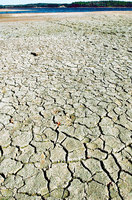Global warming a threat to Texas water supply
March 27, 2007
Scientists said Texas has reached or exceeded its maximum annual average temperature and must adapt to changes that are inevitable but not predictable.
Written by DINA CAPPIELLO, HOUSTON CHRONICLE

The parched and cracking lake bed of Lake Tyler
AUSTIN — With a dozen bills addressing global warming before the Legislature, lawmakers on Monday had a chance to hear from experts about what a rise in the Earth's temperature means for Texas and what can be done about it.
The briefing represented a rare visit to the Texas Capitol for four of the state's foremost climate scientists who have spent more time speaking with legislators in other states and the U.S. Congress than lawmakers here.
The presentation shed some scientific light on the bills filed this session on climate change, an issue that until this year saw little legislative action in Texas.
The scientists said Texas has reached or exceeded its maximum annual average temperature and must adapt to changes that are inevitable but not predictable.
"How is it that I can make a decision about Texas when the things I need to know most ... are uncertain," said Eric J. Barron, dean of the Jackson School of Geosciences at the University of Texas at Austin. "We are going to have to make decisions with uncertainty."
The scientists agreed that Texas should focus its efforts on water resources, since a warmer climate is expected to increase evaporation and decrease precipitation in the state. Recent data, however, show a 6 percent to 10 percent increase in rainfall.
A bill sponsored by Rep. Eliot Shapleigh, D-El Paso, is seeking a study to analyze how climate change will affect the state's water supply.
"I'm not ready to say we are going to dry up and blow away in dust, but this is an area where water planners need to pay attention," said Gerald North, a distinguished professor in geosciences at Texas A&M University.
The hourlong discussion, organized by Rep. Lon Burnam, D-Fort Worth, the sponsor of five of the climate bills, drew only about a dozen staffers.
Part of the reason was that the House was in session. But others said it showed a lack of will by lawmakers to tackle the issue, even though Texas emits more heat-trapping carbon dioxide than any other state.
The bills' sponsors have said much of the legislation has no chance of passing. Gov. Rick Perry and Lt. Gov. David Dewhurst have said they doubt that emissions from human activities are causing global warming, a link the four scientists Monday said was conclusive.
Katharine Hayhoe, an associate professor of atmospheric sciences at Texas Tech University compared the turnout Monday with a presentation she made to all 250 members of the New Hampshire Legislature in January.
"It was quite a dramatic contrast," Hayhoe said. "They didn't care about the science; they wanted to know what to do."
![]()
![]()
Related Stories
![]()
Fair Use Notice
This site contains copyrighted material the use of which has not always been specifically authorized by the copyright owner. We are making such material available in our efforts to advance understanding of environmental, political, human rights, economic, democracy, scientific, and social justice issues, etc. We believe this constitutes a "fair use" of any such copyrighted material as provided for in section 107 of the US Copyright Law. In accordance with Title 17 U.S.C. Section 107, the material on this site is distributed without profit to those who have expressed a prior interest in receiving the included information for research and educational purposes. For more information go to: http://www.law.cornell.edu/uscode/17/107.shtml. If you wish to use copyrighted material from this site for purposes of your own that go beyond "fair use", you must obtain permission from the copyright owner.